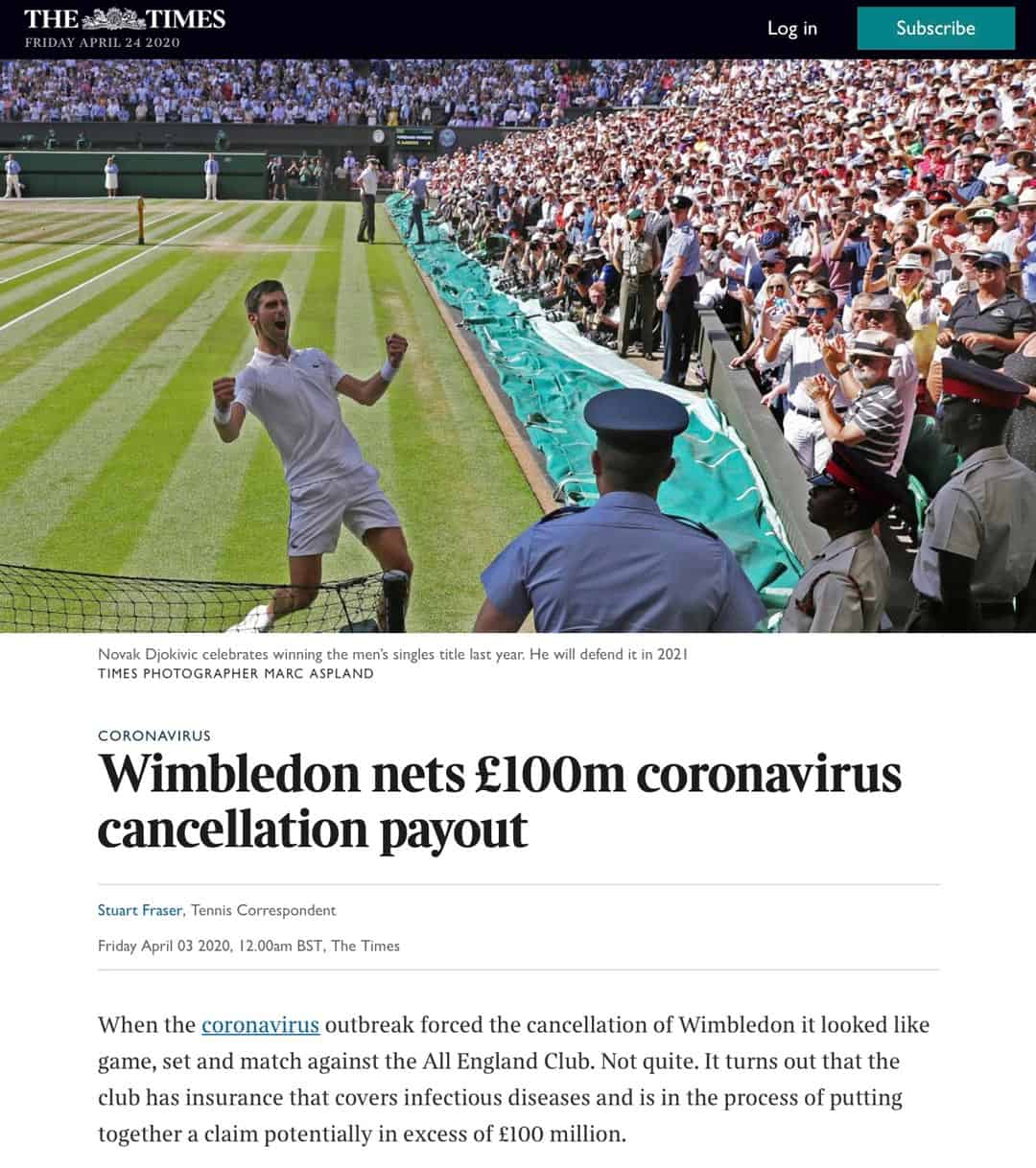Image by Meaning March / Shutterstock.com
The coronavirus crisis is throwing up all sorts of opportunities that would not otherwise be available. One of them is the chance to become an investor in the world-famous Wimbledon tennis courts.
This particular security is usually tough to get hold of. Trades are far and few, and the price at times reflects its rarity rather than the actual investment value.
In the day and age of the great lockdown, everything has changed.
You can currently pick from a whole number of potential sellers. Prices are visibly under pressure.
Is it a worthwhile investment?
I set out to investigate.
It's not a bond, not a stock, not a ticket – it's a "Wimbledon Debenture"
Wimbledon does not need an introduction. The name of the South-London borough has become a synonym for the world's oldest and most prestigious tennis tournament. It is the only Grand Slam competition that is played on lawn. Each year, about 500,000 spectators get to see a match live, and hundreds of millions follow it through the press, radio, television and online.
The organiser of the event is the All England Lawn Tennis & Croquet Club. However, given the event's commercial nature, the 152-year-old club transferred the relevant assets and activities to a for-profit company. The All England Lawn Tennis Ground plc owns the tennis courts, grounds and buildings in Wimbledon, and it is in turn 100% owned by the club.
With no stock in free float, how can you become an investor?
The company regularly has to undertake extensive investments, which it funds through the issuance of so-called debentures. These are, in effect, unsecured securitised loans that come with special club privileges. It is a VERY quirky security.
Anyone subscribing to an issue of debentures will have to stump up a cash investment. However, whereas a bond would typically require you to send all the money upfront, with Wimbledon Debenture, you'll pay the cash in phases throughout the duration of the debentures.
Also, you won't get an interest rate payment.
Instead, debenture holders receive:
- A fixed number of free tickets to tournaments on specific tennis courts.
- Several related privileges, such as the use of VIP restaurants and reserved parking spaces.
- A right of first refusal to subscribe to the next issue of debentures, so that they can remain invested after their current debenture has expired.

Debenture owners get to enjoy Wimbledon in style.
Technically speaking, the debentures are a zero-coupon debt security that comes with an in-kind dividend in the form of tickets. The tickets issued to debenture holders account for 17% of the Wimbledon facilities' capacity.
Why does Wimbledon do it like that, and what's in it for someone who views it as an investment?
It is quite a complex instrument, but here is everything explained in a nutshell.
Fans turned investors provide cash for ongoing improvements
Just recently, the company had an opportunity to buy out the neighbouring Wimbledon Park Golf Course for GBP 65m, which made sense because it creates space for additional, much-needed tennis facilities. However, even a company as successful as The All England Lawn Tennis Ground plc (and the club backing it) does not have this sort of money lying around.
Also, the existing facilities usually need extensive new investments every decade or so.
During the late 2000s, the company added a retractable roof to the Centre Court. It took two years of computer modelling to plan the 65-by-75-metre (roughly 213-by-246-foot) hydraulically operated structure of translucent fabric supported by steel trusses. One of the challenges was the fact that moisture on the grass can affect a ball's bounce. To ensure the humidity stays down when the roof is closed, over 600 air distributors pump dry air into the building – in perfect silence. The roof was a worthwhile investment because it reduces the number of cancellations of matches due to rain. The cost of the roof was never disclosed, but it is believed to have been close to GBP 100m.
A similarly expensive project was the construction of a retractable roof over Court No. 1 (which, besides the Centre Court, is the most desirable court for players and spectators alike). It was finished in 2019, and its reported cost of GBP 70m included an all-round, overdue refurbishment of the entire building.
To fund such extensive investments, The All England Lawn Tennis Ground plc issues bond-like instruments. Investors do not get any collateral and need to invest in the scheme purely on the back of the club's credibility. The scheme was established in the 1920s, and it's been successful ever since.
In essence, it taps tennis fans for cash, in exchange for secured seating and VIP status. By keeping the debentures scarce, they are turned into a status symbol. Since they are freely tradable, the debentures also represent a financial instrument.
Wimbledon projects funded by debentures
| 2017 | No. 1 Court retractable roof and expansion of seats and facilities |
| 2011 | New No. 3 Court |
| 2009 | Centre Court retractable roof, new seating, new No. 2 Court |
| 2008 | Centre Court capacity increase from 13,800 to 15,000, new bars and restaurants |
| 2006 | New museum building, with shop, club offices and ticket office |
| 2002 | Revamp of the clubhouse and the royal box area |
| 2000 | Construction of the Millennium Building for players and press |
| 1997 | New No. 1 Court and broadcast centre |
The sky-high value of the debenture ticket issue
Getting tickets to Wimbledon events is difficult and expensive. The general public has to apply through an annual lottery (which millions do), or through queuing. If you plan to queue, better bring your tent and come a few days early. The payoff, if you succeed, will be significant. Regular tickets are priced between GBP 64 and GBP 225, which is a fraction of what tickets go for on the open market.

People do sleep in tents for several nights to be at the front of the queue for Wimbledon tickets.
Tickets are also available through hospitality companies. These generally sell packages, most of which are aimed at corporations who want to entertain clients. Prices are nothing short of insane, ranging from GBP 1,000 for less desirable matches to nearer to GBP 10,000 for the finals. Attending a few days of the tournament can easily cost you the equivalent of a brand-new car. A rule of thumb is that if you want to see the Wimbledon event from beginning to end, you will have to spend GBP 20,000 to GBP 30,000. That's per person, by the way.
The tickets sold for outrageous prices by hospitality companies are often tickets that owners of debentures have decided to pass on. Debenture owners are entirely free to sell any tickets issued to them, through any means they chose. The club is famous for strictly policing its rule that regular tickets issued to the public cannot be resold by ticket touts. However, tickets issued to debenture owners can even be sold on eBay.
Debenture holders have four options on how to put their tickets to use:
- Go and watch the matches themselves (or gift the tickets to anyone they like).
- Sell them to hospitality companies, which will resell them at a higher price.
- Sell them back to the club, which, in turn, will also try to resell them at a higher price.
- Sell them on eBay, Gumtree, StubHub, or any street corner.
Investors have three obvious strategies to turn the debentures into a worthwhile investment:
- Sell all of the tickets issued to them and simply try to make as much money as possible.
- Sell as many tickets as they need to earn back the investment. Then use the remaining tickets to attend Wimbledon for free and in VIP-style!
- Resell the debenture itself at a higher price, which they can do during the debenture's duration.
Of course, one can also choose any combination thereof. Debentures are issued with a five-year duration, which gives plenty of time to try out what works best.
What are the prospects for these strategies to earn you a decent return? Could the current period of uncertainty help you achieve them?

Yours truly in 2004, when I treated my mum to a week's worth of Wimbledon matches. We watched Maria Sharapova totally beat the shit out of Serena Williams (6-1, 6-4). The victory was hailed by the media as "the most stunning upset in memory". You do need a bit of luck with picking the right tickets!
The most profound debenture market disruption since 1945
Wimbledon recently made media headlines because of its successful insurance strategy. Unlike almost all other large-scale sporting events, Wimbledon did not suffer catastrophic financial consequences because of the coronavirus crisis.
For nearly two decades, Wimbledon had paid an additional insurance premium to specifically cover pandemics – which, in 2020, paid off handsomely. For the first time since 1945, Wimbledon had to cancel this year's tournament. The company is reportedly set to receive an insurance payout in excess of GBP 100m; not too bad after 18 years of paying an extra GBP 1.5m per year. The board had demanded such insurance after the 2002 SARS breakout.

Some event organisers have better insurance coverage than others.
The cancellation of this year's event and the global fallout of the coronavirus crisis has sent (minor) shockwaves through the elite market of Wimbledon Debentures:
- The event not taking place renders this year's debenture ticket issuance useless.
- Some debenture owners will be concerned that large-scale sporting events will be affected in future years, too. Even if events take place, the demand for tickets could be a lot lower.
- Other debenture owners will be strapped for cash. More debenture holders than usual will now be looking to sell their debentures.
Thanks to the insurance, debenture holders should not suffer a loss per se on this year's debenture. However, even the elite market for Wimbledon Debentures is visibly affected by the events of the past months.
Up until February 2020 (!), prices for debentures were riding on a record wave. People were flush with cash in general, and owning a Wimbledon Debenture seemed like a wonderful status symbol cum investment. Corporations were happy to pay top dollars for hospitality tickets, which in turn fuelled the resale value of debenture tickets. Debentures rarely appeared on the secondary market. If you had one, you simply kept and milked it for all its worth.
Then, the coronavirus struck.
I procured the available data on recent transactions in debentures, and it does appear like there is currently an overhang of supply as well as significant pressure on prices.
Anyone eager to explore this potential investment is probably well advised to look into the details soon.
What the market looks like in the aftermath of the coronavirus crash
These debentures come in different classes.
The ones that are currently outstanding are:
- Centre Court 2021-2025
- Centre Court 2016-2020
- Court No. 1 2017-2021
Each of them has a few specificities. The Centre Court debentures will get you tickets for 13 matches each year, Court No. 1 debentures for ten matches.
The issue for 2016-2020 is about to expire, and you can essentially forget about it. The owners of that debenture will receive a repayment of GBP 2,000 later this year, but this particular issue's right of first refusal for the next issue has already expired.
The other two outstanding issues are all the more interesting:
- The Court No. 1 2017-2021 debenture now only has one year left. Its pricing is now much more straightforward, and it hinges on the (somewhat speculative) outlook for the first year after the coronavirus crisis.
- The Centre Court 2021-2025 debenture currently represents a complete debenture cycle of five seasons. It was also issued at record prices, and you might now be able to find a few distressed sellers.
Here is the interesting thing that happened at the weekly auction organised by a London-based brokerage firm, Dowgate Capital.
As recently as 28 February 2020, the Centre Court 2021-2025 issue traded for GBP 100,000. Supply was scarce at the time. Another trade took place at GBP 99,500 on 5 March 2020.
Since then, the market has ground to a halt. No transaction has taken place in these debentures since early March 2020.
Instead, you now have 11 (!) pairs of Centre Court 2021-2025 debentures for sale. Almost all transactions are for pairs, instead of single tickets. That's 22 debentures put up for sale. For the Wimbledon Debenture market, that's almost unheard of an overhang of supply.
At the auction during the week before this article, the asking price for the debenture was GBP 95,000. On the day before I published this article, the asking price had dropped to GBP 94,000.
The best bid during the previous week was GBP 70,000. This represented a WIDE spread between buyers and sellers. On the day before I published this article, the best bid had risen to GBP 74,000. Notably, no transaction took place at all. The price difference between willing buyers and sellers was still too big – but it was already narrowing.
A similar situation prevailed for the Court No. 1 2017-2021 debenture. A fairly significant eight pairs of debentures are for sale. The last transaction had taken place at GBP 19,400 on 19 March 2020. The lowest asking price at the most recent auction was GBP 18,000 (down significantly from GBP 22,000 the previous week), and the highest bid was GBP 14,500 (up from GBP 14,000 the previous week).
You now have:
- Plenty of supply, and at least some potential sellers seem to be lowering their prices.
- Potential buyers who are only willing to offer prices that are way below the most recent transactions.
Who is going to lose their nerves first?
It does look like a situation where you might just be able to strike a bargain. At the time when the Centre Court 2016-2020 issue still represented a complete book of future tickets, it traded as high as GBP 141,500. Prices also tend to be influenced by how many famous players the sport has at the time. It is widely said that Roger Federer single-handedly increased the price of Wimbledon Debentures.
Just what determines the price trends of these debentures, and how can you work out if they offer a decent financial return?
Estimating an investment return
If you thought forecasting the movements of stocks or bonds was difficult, you haven't come across the world of Wimbledon Debentures.
For a start, there are no reliable historical records about the returns they offered. Prices from past auctions are available, but these are only telling a part of the story.
The way how to earn a return from these debentures is to sell some or all of the tickets for cash. Since everyone is free to sell these tickets through any channel they like, there is no dataset about ticket transactions and how they related to the price of the debenture.
Some indicative data is available, though.
Had you purchased the Centre Court 2016-2020 issue at its issue price of GBP 50,000, you could have recouped about GBP 70,000 purely by reselling all your tickets to hospitality companies. These companies tend to mark up the tickets substantially when selling them on – I estimate roughly 100%. If you bothered to sell your tickets individually to people who are looking to buy without going through a hospitality firm, you could have made a lot more than GBP 70,000 off your tickets.
A crucial aspect is whether you are already on the debenture-loop or not. Remember the right of first refusal for future issues. If you already own a debenture, you can participate in the sale of the next debenture issue at its official issue price. When it was issued, the Centre Court 2016-2020 issue would have cost GBP 50,000 at its official issue price but somewhere around GBP 100,000 on the secondary market (before peaking at GBP 141,500). Which is why an opportunity to buy existing debentures at a coronavirus discount could be so interesting.
Also, there is always the possibility of simply having a bit of luck. According to the media, someone once sold a single ticket to a Centre Court final match with Roger Federer for an astonishing GBP 90,000. That debenture holder would have earned back the entire investment from the sale of a single ticket, and still have 64 other tickets left from their debenture. Trawling through public records, I found a number of references to such one-off deals. As far back as 2013, someone pocketed GBP 35,500 each for two tickets to the final between Andy Murray and Novak Djokovic.
Just like with other investments, it all depends on how much effort you are willing to put in. Selling tickets individually requires time, and taking the risk of not selling them after all. However, you could also strike a gold vein.
The best way to turn these debentures into a good investment would be to try and purchase them at a reasonable price during a downturn AND to view them as a multi-decade investment where you take up future issues of debentures at their issue price. When it issues new debentures, Wimbledon has to price them attractively because it needs to sell a large number at the same time. You do need to pay the secondary market price once to be on the issuance loop; thereafter, your return is almost guaranteed because Wimbledon wants to keep the issue price at a level that guarantees a positive return for subscribers.
Is it worth all the hassle, though?
Probably not, given that there are so many other investments that are easier to buy and sell.
For someone who fancies the idea of being part of tennis history and occasionally venturing out to Wimbledon themselves, it's an entirely feasible idea financially.
And the time to try and strike a deal to "join the club" (almost literally) would be now. The issue price of the Centre Court 2021-2025 issue was GBP 80,000. Right now, anyone looking to sell immediately would not be able to recover the issue price. Due to corona, the market is quite out of whack! If purchased at such a price, you might even be able to sell the debenture itself at a profit. Historically, they tended to trade at around twice their issue price. Provided, of course, matches are not cancelled because of pandemics.
Further reading
If this obscure, complex and quirky security tickles your fancy, you should read the prospectus of the Centre Court 2021-2025 issue. I have saved a copy of the prospectus on my server for you to download. (Tennis fans in particular will enjoy this: the first 50 pages cover Wimbledon's history; the boring financial aspects only appear in the back of the document.)
The club keeps a guide to debentures on its website.
There is also a dedicated website for Wimbledon debenture holders.
The weekly auction for these debentures is organised by Dowgate Capital. The auction results are also advertised in the Financial Times on the first Saturday of each month.
There are a lot more details to it than I can cover, including:
- Taxes, including VAT on the sale of tickets.
- Restrictions on some nationalities (Americans, Canadians, South Africans, Australians, and Japanese are not legally permitted to purchase them).
- Technicalities for the transfer, such as requiring a UK brokerage account.
It is quite a technical investment.
The message is loud and clear. Wimbledon Debentures – for tennis aficionados only.
Did you find this article useful and enjoyable? If you want to read my next articles right when they come out, please sign up to my email list.
Share this post:
Get ahead of the crowd with my investment ideas!
Become a Member (just $49 a year!) and unlock:
- 10 extensive research reports per year
- Archive with all past research reports
- Updates on previous research reports
- 2 special publications per year








